Canton, Ontario
Canton is a hamlet in southeastern Ontario, a few kilometers (a few miles) north of Port Hope. It has a small wooden chapel built in 1832, one of the oldest in the region. Canton was once the home of Vincent Massey, the lawyer, diplomat and Governor General of Canada.
Canton | |
|---|---|
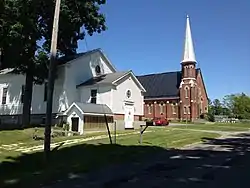 1832 chapel (foreground) and 1876 church | |
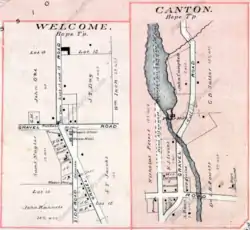 Plan of Welcome and Canton in 1878 | |
 Canton Location in Ontario | |
| Coordinates: 43.9976°N 78.35097°W | |
| Country | Canada |
| Province | Ontario |
| County | Northumberland |
| Municipality | Port Hope |
| Elevation | 122 m (400 ft) |
| Time zone | UTC-5 (EST) |
| • Summer (DST) | UTC-4 (EDT) |
Location
Canton is on County Road 10 where it crosses the Ganaraska River, at an elevation of about 122 m (400 feet) above sea level.[1] It is about 8 km (5 miles) inland from Port Hope.[2] Canton Airport lies about 0.5 km (0.31 miles) to the northwest of Canton at an elevation of 160 m (520 feet). It has an asphalt runway 597 by 12 m (1,958 by 40 feet) that is not maintained in winter.[3]
Foundation
The Hawkins family came from Port Hope to settle in Canton before 1820.[4] A log building on the property of James Hawkins was used as a school and chapel by 1820. The wooden "Hope Chapel" was built by the people of Canton in 1832.[5] The small wooden Methodist chapel was one of the first churches in the area. The chapel and graveyard lie on the fourth line, just east of County Road 10.[6] The oldest grave is that of a member of the Hawkins family.[4]
19th century
An 1869 gazetteer of Ontario described Canton as a village on Smith's creek,[lower-alpha 1] in the township of Hope, County Durham. The average price of land was CDN$50 per acre, and the population was 100 in twenty-eight households. Most of the people were farmers, but there was a justice of the peace, a doctor, a Wesleyan minister, a postmaster and general merchant, a lumber dealer, a miller, a dressmaker, two coopers, two carpenters and Thomas Martin, proprietor of the Canton Hotel.[8] A new church building was erected beside the Hope Chapel by local craftsmen in 1876.[6]
By 1880 the post village of Canton had a population of 200.[9] The Canton Mill on the Ganaraska River has a date stone that says "W.H.Kinsman, Canton, 1886".[10] The Advertisers Handbook of 1912 reported that the mill was still operated by W.H.Kinsman. The mill was water-powered, used for grinding flour.[11] Fred Currelley, secretary of the Perrytown cheese factory, lived in Canton in 1891.[12]
Sergeant Edward Edwin Dodd(s) (1845–1901) was born nearby. During the American Civil War (1861–65) he served as a volunteer and was awarded a Medal of Honor for bravery in rescuing his wounded captain in the face of enemy fire. He is buried in the Canton cemetery, which has a commemorative plaque in his honor.[13]
20th century
The village was once the home of Vincent Massey (1887–1967).[6] The Masseys purchased an old farmhouse and surrounding property in 1918, and converted it into Batterwood House in 1927, the Masseys' main residence.[14] The Batterwood property was next to the property of George MacKinnon Wrong, a longtime friend of Massey who was Professor of Modern History at the University of Toronto.[15] Eugene Forsey, who had been hired to teach the two Massey boys wrote, "The place is beautiful – rolling country, lightly wooded here and there with a stream ending in a mill pond almost below the hill window."[14]
In 1927 the Massey Foundation and the Canton United Church provided funding to move the Hope Chapel from its original location on the northwest corner of the property to its present site. The building was placed on cement foundations, was lengthened to include a stage, and had a kitchen and dining room added.[5] The Hope Chapel is now the Canton Hall.[16] As of 2014 the church was in good repair, with a new steel roof, but attendance was low.[6] The Canton Mill still stands, but is privately owned and is not open to the public.[17]
The Canton Municipal Office, at 5325 County Road 10, is just to the north of the village.[18] In 2007 a consultant reviewed the use and condition of properties owned by the municipality of Port Hope. One of the recommendations was to relocate parks, recreation and culture staff from the Canton Municipal Office to the Town Hall. The Canton Municipal Office could be used as a community meeting space.[19]
 Mill creek west from County Road 10
Mill creek west from County Road 10 Canton United Church
Canton United Church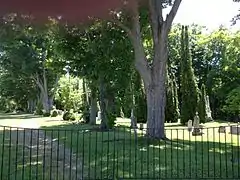 Graveyard
Graveyard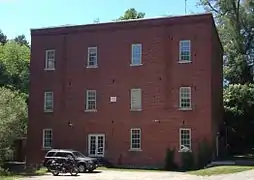 Former flour mill
Former flour mill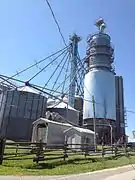 Grain storage on Kellogg Road to the west
Grain storage on Kellogg Road to the west Looking south from St. Paul's Anglican Church in Perrytown towards Canton and Lake Ontario
Looking south from St. Paul's Anglican Church in Perrytown towards Canton and Lake Ontario
References
Notes
- The Ganaraska – and Port Hope – were called "Smith's Creek" after the early settler Peter Smith, a fur trader who had a house near the mouth of the creek in 1788. The settlement was renamed "Port Hope" in 1818, despite a move to call it "Toronto". The Mississaugas called the creek "Pemitiscutiank". It took its present name from the Cayuga village of Ganaraske, which stood on the creek.[7]
Citations
- Canton, geonames.
- Raza 1990, p. 336.
- Canton Airport, SkyVector.
- Canton, Old Durham County.
- Hope Chapel, United Church of Canada.
- Canton United Church, wondercafe.
- Founding of Port Hope, Heritage Trust.
- McEvoy 1869, p. 91.
- A Complete Pronouncing Gazetteer... 1880, p. 370.
- Stiver 2014.
- Advertisers' Hand Book ... 1912.
- Ontario. Legislative Assembly 1891, p. 67.
- Maclear, Fetherling & Gaffen 2013, p. 324.
- Milligan 2004, p. 19.
- Milligan 2004, p. 20.
- Northumberland county Top 5..., p. 2.
- Northumberland, OHS.
- Contact, Municipality of Port Hope.
- Report looks at future options... 2007.
| Wikimedia Commons has media related to Canton, Ontario. |
Sources
- A Complete Pronouncing Gazetteer, Or, Geographical Dictionary of the World: Containing Notices of Over One Hundred and Twenty-five Thousand Places : with Recent and Authentic Information Respecting the Countries, Islands, Rivers, Mountains, Cities, Towns, Etc., in Every Portion of the Globe. J.B. Lippincott. 1880. Retrieved 2014-07-11.
- Advertisers' Hand Book... Containing a List of Flour Mills in the United States and Canada. 1912. Retrieved 2014-07-11.
- "Canton". geonames. Retrieved 2014-07-11.
- "Canton Airport". SkyVector. Retrieved 2014-07-11.
- "Canton". Old Durham County. Retrieved 2014-07-12.
- "Canton United Church". wondercafe. Archived from the original on 2014-07-14. Retrieved 2014-07-11.
- "Contact". Municipality of Port Hope. Archived from the original on 2014-03-27. Retrieved 2014-07-12.
- "Founding of Port Hope" (PDF). Ontario Heritage Trust. 1968. Retrieved 2014-07-12.
- Maclear, Michael; Fetherling, George; Gaffen, Fred (2013-10-21). Dundurn Vietnam War Library Bundle: Guerrilla Nation / Indochina Now and Then / Cross-Border Warriors. Dundurn. ISBN 978-1-4597-2407-5. Retrieved 2014-07-11.CS1 maint: ref=harv (link)
- "Hope Chapel". United Church of Canada and East Durham Historical Society. 1 June 2003. Retrieved 2014-07-12.
- McEvoy, Henry (1869). The Province of Ontario Gazetteer and Directory: Containing Concise Descriptions of Cities, Towns and Villages in the Province, with the Names of Professional and Business Men and Principal Inhabitants, Together with a Full List of Members of the Executive Governments, Senators, Members of the Commons and Local Legislatures, and Officials of the Dominion, and a Large Amount of Other General, Varied and Useful Information, Carefully Compiled from the Most Recent and Authentic Data. Robertson & Cook. p. 91. Retrieved 2014-07-11.CS1 maint: ref=harv (link)
- Milligan, Frank (2004). Eugene A. Forsey: An Intellectual Biography. University of Calgary Press. ISBN 978-1-55238-118-2. Retrieved 2014-07-11.CS1 maint: ref=harv (link)
- "Northumberland county Top 5 Driving Routes". Retrieved 2014-07-11.
- "The Ontario Heritage Directory Online". Ontario Historical Society. Archived from the original on 2014-07-14. Retrieved 2014-07-11.
- Ontario. Legislative Assembly (1891). Sessional Papers – Legislature of the Province of Ontario. Retrieved 2014-07-11.CS1 maint: ref=harv (link)
- Raza, Moonis (1990-01-01). Geographical Dictionary Of The World In The Early 20th Century With Pronouncing Gazetteer (in 2 Vos.). Concept Publishing Company. ISBN 978-81-7268-011-4. Retrieved 2014-07-11.CS1 maint: ref=harv (link)
- "Report looks at future options for municipal buildings". Northumberland News. 27 September 2007. Retrieved 2014-07-12.
- Stiver, Harold (30 July 2014). "Canton Mill: Ontario's Old Mills". Retrieved 2014-07-11.CS1 maint: ref=harv (link)